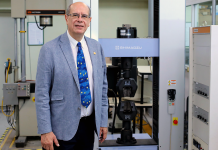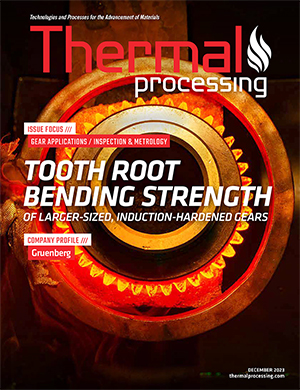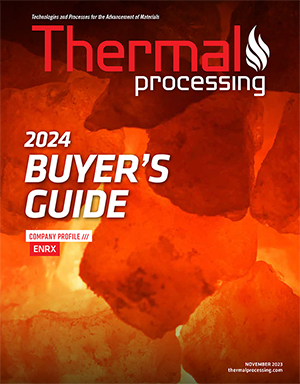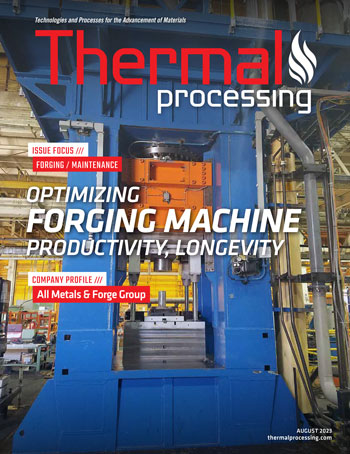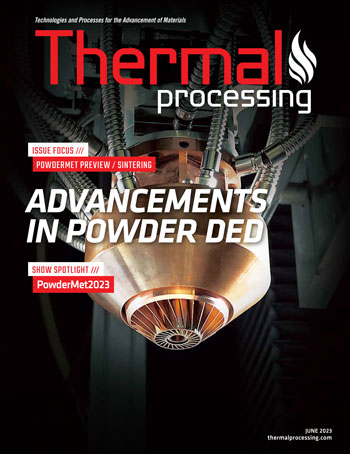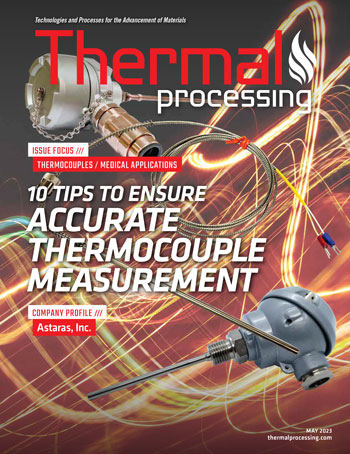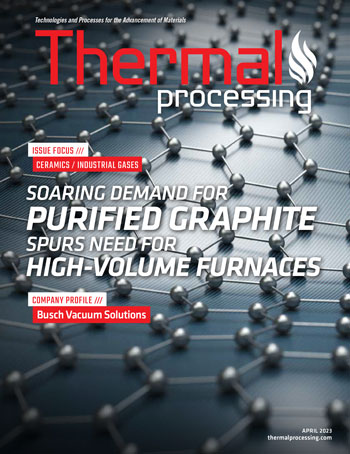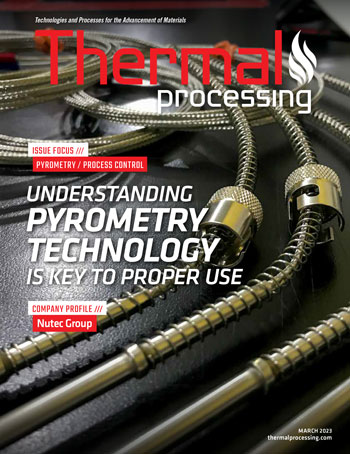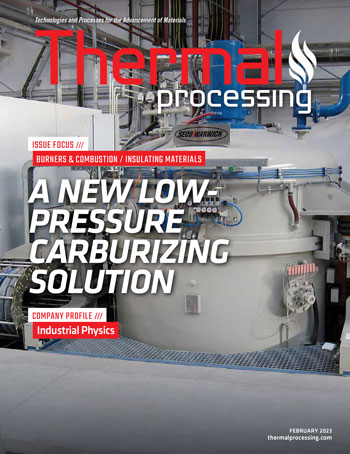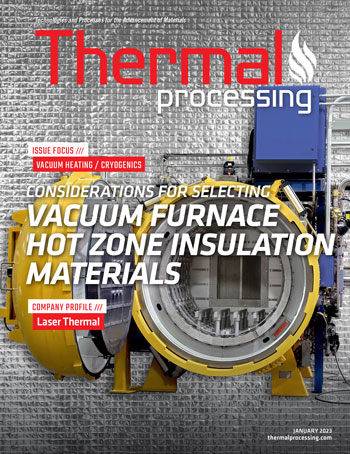Archives
December 2023
Investigations on the tooth root bending strength of larger-sized, induction-hardened gears
Surface hardening is an economical and technological alternative to case hardening. This is especially true for larger-sized gears. Due to the necessary high case-hardening depths required for larger case-hardened gears and due to technological boundaries (e.g., heat-treatment furnace size and heat-treatment duration) typical surface-hardening processes such as flame or induction hardening can exhibit their benefits […]
10 steps for accelerating thermal processing decarbonization
Companies throughout the thermal-processing sector are under increased pressure to meet CO2 emission reduction goals, particularly net-zero emissions, by 2050 or sooner. At the same time, they must meet increasingly uncertain energy source demands. All of this must be done cost-effectively. Honeywell Thermal Solutions recommends 10 steps to help organizations accelerate their progress in achieving […]
Balancing a plant security profile
In today’s technology-driven world, where cyber threats dominate headlines and organizations invest significant resources in safeguarding their OT and IT infrastructure from digital threat vectors, the importance of physical security of a process facility can sometimes be overlooked. However, it remains an essential component of enterprise risk mitigation. Process industries are no place for uncertainty […]
October 2023
DFARS, NIST SP 800-171, and CMMC 2.0 compliance
As a heat treater, if you are providing services or products to a Department of Defense (DoD) contractor, a downstream supplier, or fall anywhere within the DoD supply chain, you are most likely affected by certain DoD mandates. Discussions around DFARS compliance, NIST SP 800-171 implementation, and cybersecurity within the federal defense contracting space is […]
Photo-chemical etching: A perfect process for heat exchanger production
Heat exchangers play a crucial role in various industrial applications, from power generation and automotive systems to HVAC systems and aerospace technology. The efficiency and performance of heat exchangers are directly related to their design and manufacturing methods. One manufacturing process proven to be ideally suited for producing high-quality heat exchangers is photo-chemical etching (PCE). […]
Selecting the right stretch forming equipment
For manufacturers, striving to increase profitability while expanding their capabilities and improving their processes, adding stretch forming to their repertoire may be the answer. Stretch forming is a unique process where material such as steel, stainless steel, aluminum, or even titanium is stretched beyond its yield point and simultaneously wrapped around net shaped dies. Forming […]
September 2023
Controlling nitrided layers and enhancing predictability of nitriding process with metallography
Nitriding is the thermochemical process for producing surface layers in ferrous alloys, such as steels and cast irons used for making various mechanical components and tools [1]. Ferritic nitrocarburizing (FNC) is a process of nitriding doped with a small amount of carbon [1]. Producing the best nitrided layers for the given application requires a good […]
Integrating 3D printing into prototyping and production scenarios
At the recent TCT 3Sixty event in Birmingham, England, 3DPRINTUK ran a competition offering vouchers to be used against the cost of future 3D printing work, which was won by leading design consultancy ITERATE Design and Innovation. Subsequent to this, 3DPRINTUK has worked with ITERATE to consider the use of 3D printing from the point […]
August 2023
Optimizing forging machine productivity, longevity
As the forging industry’s most experienced maintenance staff and equipment operators retire, keeping legacy machines producing at full capacity is increasingly difficult. When new employees lack sufficient expertise and decades-old forging equipment breaks down, the result can be very costly, extended downtime. “A seasoned team may know all the ‘ins and outs’ of every forging […]
Aerospace Forging Market: An Avenue of Opportunities
Forging is a manufacturing process that has come a long way in the last century. In simple terms, forging is a process of shaping metal with the use of heat and pressure. When alloys are forged, parameters such as temperatures, processes, thermal cycles, and machines are changed to meet the demands. These forged parts are […]
6 Benefits of AR in manufacturing
Manufacturers are increasingly incorporating augmented reality in their digital transformation strategy. Augmented reality provides a multiplier effect for improving the efficiency and quality of production and inspection processes. Defect detection assistance, improved production rate, increased safety for the factory and teams, increased productivity, reduced cycle times, and, above all, reduced costs: The benefits are numerous. […]
July 2023
Inductive heating and flow chemistry: A perfect synergy of emerging enabling technologies
Inductive heating has developed into a powerful and rapid indirect heating technique used in various fields of chemistry but also in medicine. Traditionally, inductive heating is used in industry, e.g., for heating large metallic objects including bending, bonding, and welding pipes. In addition, inductive heating has emerged as a partner for flow chemistry, both of […]
Using polymer quenchants in an integral quench furnace
There have recently been several inquiries regarding the use of a polymer quenchant in a sealed or integral quench furnace. There are several drivers for this — cost, for example. While the polymer quenchants have a higher-per-gallon cost than oil quenchants, the in-use concentration of polymer quenchants is much less than an oil. There are […]
Advanced SAM validates integrity of diffusion bonds
Industries with demanding metal-bonding applications are increasingly relying on diffusion bonding, an essential joining method for achieving a high-purity interface between two similar or even dissimilar metals. The process involves applying high temperature and pressure to metals mated together in a hot press, which causes the atoms on solid metallic surfaces to intersperse and bond. […]
June 2023
Advancements in powder DED
Powder DED, or directed energy deposition, has become a useful and economical tool within the world of metal-based additive manufacturing. Advancements within the process over the last few years have made it an even more impressive innovation now being used in a variety of industries, including aerospace, defense and military, oil and gas, mining, shipbuilding, […]
The effects of sintering temperature and atmosphere on stainless steel
So far, unlike metal injection molding (MIM), conventional powder metallurgy technology (PM) has not been regarded as a method for producing structural elements from 17-4 PH powders, due to the problems of obtaining almost fully compacted shapes after sintering. Nevertheless, recent research demonstrates it is possible to manufacture sintered parts with high strength by pressing […]
May 2023
10 tips to ensure accurate thermocouple measurement
Careful selection and installation of temperature sensors can ensure accurate sensor performance, which in turn improves product quality and production efficiency. 1: Select the Correct Sensor Assembly for the Application This may seem self-evident, but it is surprising how often process efficiency is hampered by using the wrong thermocouple type. Factors such as time at […]
Carburized steel mechanical properties: Bending ultimate and impact strength
Editor’s note » This is part three of a three-part series on carburized steel mechanical properties. In Part 2, it was determined that a test bar must have a radius or stress concentration in order to predict what will happen with a carburized gear loaded in bending. It was also determined a new test bar […]
Effect of heat treatment on some titanium alloys used as biomaterials
Titanium-based alloys are constantly improved to obtain properties suitable for their use. Improving titanium alloys is very important for performing alloys without side effects. In this article, effects of structure, microhardness, and indentation tests of eight titanium alloys were investigated after aging. The heat treatment consisted of a high-temperature quenching accomplished in three steps (650°C […]
April 2023
Soaring demand for purified graphite spurs need for high-volume furnaces
The global demand for graphite is surging and expected to continue for decades, driven by the broad use of graphite for a range of products such as batteries for EV cars and energy storage systems, LEDs, solar equipment, high-performance semiconductors, and critical components in high-temperature furnaces. In an ironic twist, the furnaces that produce high-purity […]
Potential of nitrogen atomized alloy 625 in the powder bed fusion laser beam process
Powder-based metal additive manufacturing processes like powder bed fusion — laser beam use gas-atomized metal powders as feedstock material. Typically, for nickel-based alloys such as Alloy 625, argon gas is used during the atomization process. Considering the larger environmental impact of argon gas compared to nitrogen gas, and the increasing use of gas-atomized metal powders, […]
Carburized steel mechanical properties: Bending ultimate and impact strength, test bars vs. actual parts
Editor’s note » This is part two of a three-part series on carburized steel mechanical properties. In part one, it was determined the carburized case was not as strong as the hardness would predict. How are carburized gears able to function as well as they do since in bending, the applied stress is greatest at […]
March 2023
Understanding pyrometry technology is key to proper use
I teach pyrometry courses throughout the year and, when I do, I include a thermocouple tutorial video from YouTube. In this video the function of thermocouples is discussed, and examples shown. I have always thought that this video gave good examples, although a friend of mine who was attending one of my courses was nice […]
The PLC-based industrial temperature control system: Design and implementation
Targeting the problem of slow response and low accuracy of the automatic temperature control system for material processing and boiler heating, a new design method is proposed to work with the PLC-based temperature control system, where the box temperature control may be achieved through the fan and the heating plate. The hardware design and software […]
Carburized steel mechanical properties: Case tensile strength
Editor’s note » This is part one of a three-part series on carburized steel mechanical properties. Carburizing is a mature heat-treating process commonly used for gears. The carbon content of the surface is typically increased to about 0.70 to 1.00 percent, and the part is oil quenched. This provides a hard, wear resistant surface or […]
February 2023
A new low-pressure carburizing solution in a pit vs. traditional pit carburizing methods
Pit Low Pressure Carburizing (LPC) for case hardening of large gears is a new approach to a traditional technology. Today’s manufacturing environment demands process, quality, and environmental improvements. Heat-treatment applications can have an extremely large impact in the reduction of overall costs and time. LPC of gears have been traditionally conducted in horizontal batch configurations […]
Mechanical properties and thermal conductivity of lightweight and high-strength carbon-graphite thermal insulation materials
Thermal insulation composites are widely used in civil and military applications; however, it is difficult to achieve the synergy of multiple technical objectives such as lightweight, thermal insulation, high-pressure resistance, and high-temperature resistance by adopting traditional preparation techniques. In this study, a novel carbon-graphite thermal insulation material was rapidly prepared by exploiting the micro-thermal press […]
How to tame a plasma: Power-delivery solutions for top process issues
Film quality, throughput, yield, etch uniformity, and sidewall control all depend on the ability to ignite, maintain, and control a stable plasma. Precise, nimble power delivery is crucial. Extremely tight accuracy is required for the stringent multi-step manufacturing processes that deposit or etch material to produce near-flawless nanostructured films on a fragile glass substrate or […]
January 2023
Considerations for selecting vacuum furnace hot zone insulation materials
Over the years, there have been many variations of hot zone insulation designs for vacuum furnace hot zones and can include the following configurations and materials. This article will summarize these designs with performance results in vacuum and power efficiency: • a: Graphite foil facing backed by 2”-3” Kaowool insulation. • b: Graphite foil facing […]
Cryogenic processing for longer tool life
In almost every industrial trade magazine, there will appear an occasional article about “cryogenics.” Thermal Processing has devoted an annual issue to cryogenic processing for several years now. A Thermal Processing article published in 2021 was perhaps the most scholarly and professionally written article in recent years. I have been researching cryogenics for the last […]
Integrated rupture disk assemblies for cryogenic equipment and storage systems
Today, cryogenics is used to provide convenient storage of large quantities of industrial gases such as nitrogen, oxygen, carbon dioxide, argon, helium, and hydrogen that are vaporized from liquid to gas at time of use in support of many industrial processes ranging from steelmaking to medical systems and welding. Additionally, cryogenic equipment provides stable, cold […]



